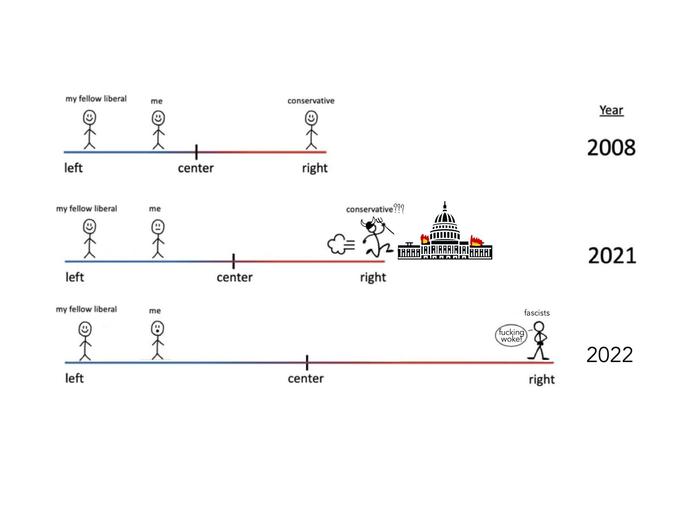One of the worst arguments Will and I had was about the 2020 presidential election.
I can still remember it vividly, as it happened in the car. The gist of his argument was that, by refusing to vote for Donald Trump, I was actively supporting abortion. I shot back that I wasn’t supporting Hillary Clinton but that there was no way I could ever vote for a candidate who espoused openly racist and sexist viewpoints, in addition to having a history of misusing corporate law. (I also had no illusions about Donald Trump’s supposedly anti-abortion stance, even then. During the argument I even mentioned that he’d “tell any lie” to curry votes.)
We found our way through the argument, but that fight was illustrative of the increasing political polarization that’s been happening in this country. I’ve pointed out that I didn’t move right so much as others moved left; but the truth is, the right has also moved even further over that direction, and that has rendered me as bereft of a political home as the leftward move I earlier mentioned.
To put this in context, I grew up in a politically diverse family; one parent was a staunch conservative and the other was fairly liberal. The same was true of at least one set of my grandparents; and I wouldn’t be surprised to find out that the other set was similarly diverse. Because of that, I’ve never equated someone’s political leanings with their character. I still refuse to do so, no matter how nasty partisan politics becomes or how many accusations I get.
It used to be that conservatives understood my positions. They didn’t always agree with them, but they would allow that I have good reasons for my moderate-left viewpoint, and that the underlying beliefs and desires that determined them were both solid and worthy of their respect. As an example, I would point out the irrefutable fact that abortions tended to increase as social welfare programs decreased, and explain that I’m more interested in stopping abortions than criminalizing them. (I still am.) That’s a viewpoint that’s clearly rooted in a pro-life stance, even if it’s not politically conservative.

Image: Know Your Meme
I once heard The Georgia Bulletin be called “liberal” simply because they did not openly denounce President Biden’s receipt of the Eucharist; the speaker apparently hadn’t noticed that the Bulletin never issues statements of support or opposition to specific politicians; it only speaks about political issues. She went on to tell me that her primary source of news was an outlet that has repeatedly been banned from various outlets due to its extremist content. I laughed and mentioned that one of mine is the Voice of America, and thus was able to redirect the conversation that way, since most Americans haven’t heard of it. (She had, so we found common ground.)
The same is true for other issues as well. After having twice been married to men who were assessed with truly injurious child support obligations — amounts that were well over 50% of the children’s actual expenses — while being systematically denied access to their own children, I’ve become sympathetic to the fathers’ rights movement. But I can’t bring myself to actually get very involved with it due to its association with the toxic men’s rights’ movement, even though it too espouses viewpoints with which I agree. (As an example, I consider the Duluth Model’s justification of female abusers to be incredibly sexist.)
I also hold a number of other liberal beliefs. One of the most prominent is that I’m a supporter of a single-payer system in the United States. In times past, conservatives have often been willing to ask my reasons for this, given what I do for a living, and have conceded that my reasons are grounded in that experience. But I’ve stopped discussing the topic, to the point of even sometimes hiding what I do for a living, because I got tired of being accused of supporting socialized medicine (I do not) or death panels (which have never existed). I’ve even had people sometimes tell me I understand nothing about my own career field simply because I don’t categorically condemn PPACA.
As with the other topics I’ve listed above, all of these are positions I have held for years. It used to be that I could find common cause with conservatives, and even with members of the Republican Party, because the values underlying those positions are the same as theirs. But, just as with the liberals, as the conservatives have moved right into conspiracy theories, explicit racism/sexism, and populist nationalism (versus patriotism), I’ve found myself needing distance. This is not the same conservative movement that I grew up around, and I’d like to think that my conservative parent and grandparent(s) wouldn’t recognize it either.
The liberals and conservatives are suffering from the same problem: too much polarization and an overwhelming “us vs. them” mentality. Real life has never been that simple, and neither is politics, which can be broadly defined as the making of the agreements by which people live together.
In the meantime, centrists like me are gradually being left out of the discourse, by both sides. But even worse, we’re now becoming vilified by both sides simply because we refuse to take the all-or-nothing approach. And in that, conservatives are just as guilty as liberals. In fact, they’ve been doing it longer.
I didn’t move left. They moved right, and by doing so they moved further away from me.